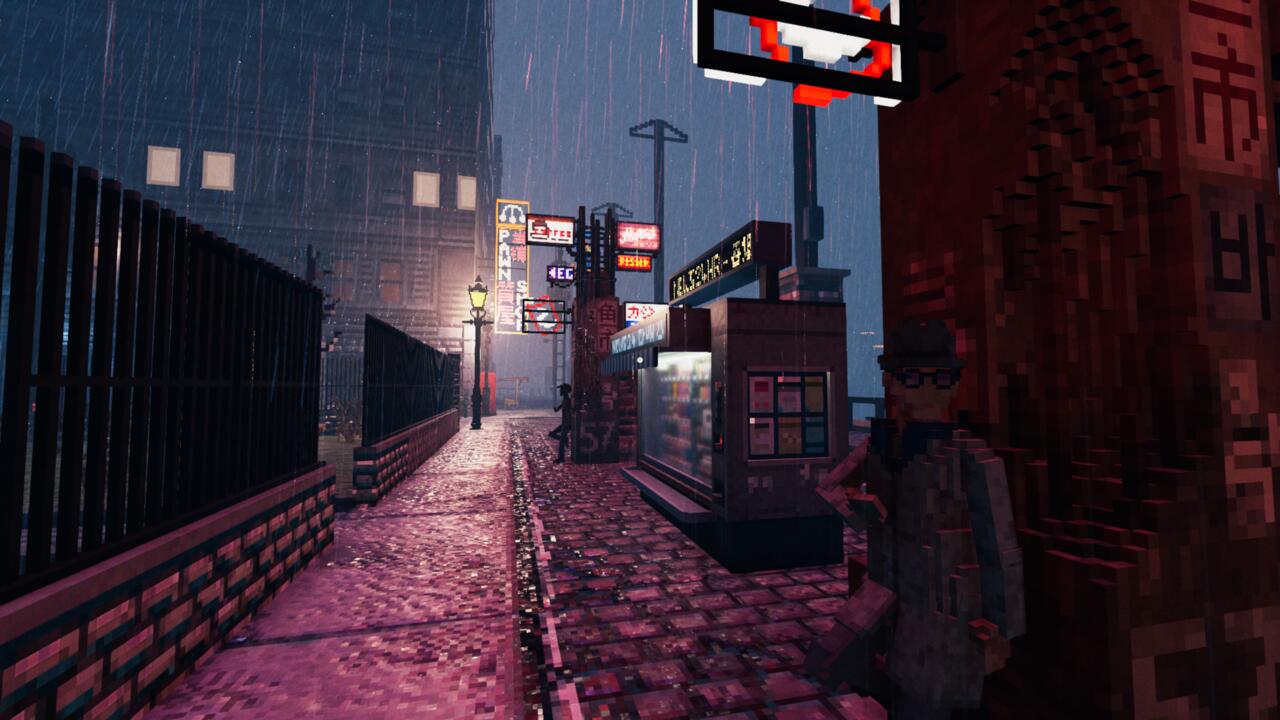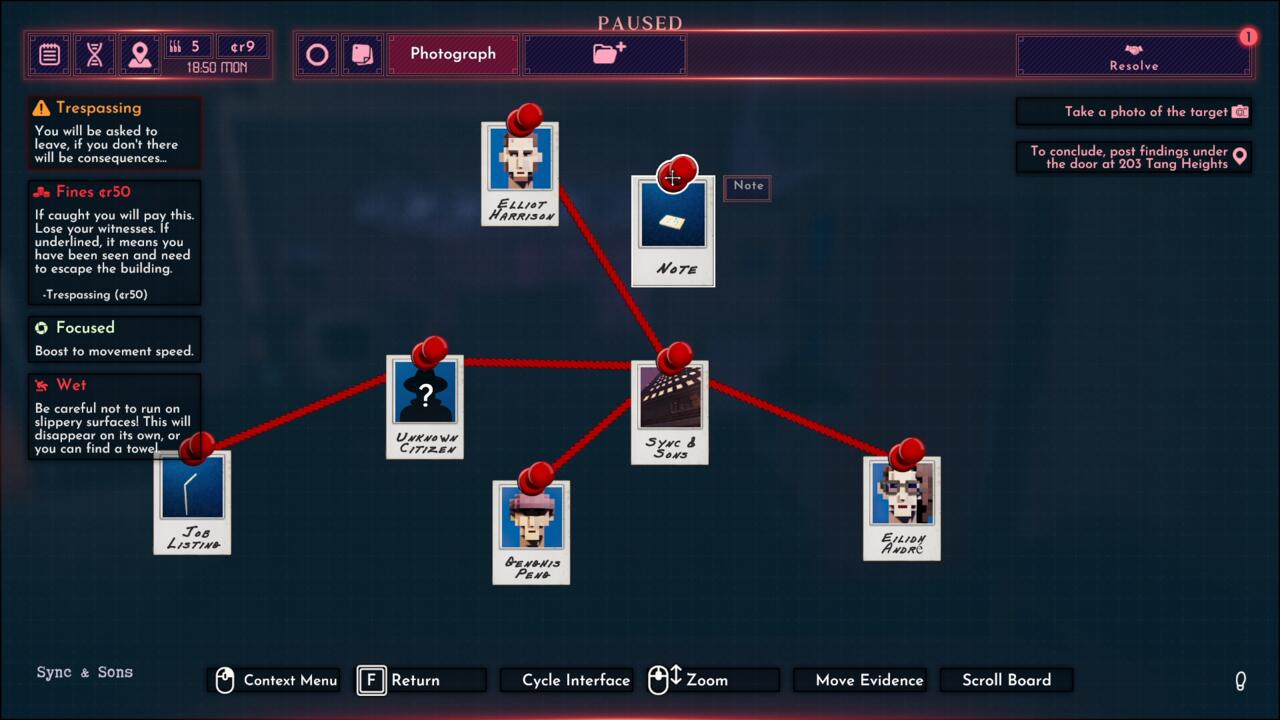A detective simulation is one of the best-suited setups for an immersive sim game, and after a few hours with Shadows of Doubt, out now in Steam Early Access, its execution of the genre’s key mechanics is something you need to see for yourself, especially if you enjoy games like Deus Ex, Thief, and virtually anything from Arkane.
At first glance, the voxel-style detective game might look like the sort of indie you find by the dozens when browsing Steam, but its remarkable freedom of choice and impressive city simulation help it stand out on a crowded digital storefront. It’s obvious the team at ColePowered Games understands the genre, and though the game is still being shaped in its early access period, it’s already become one of my favorite games of 2023.
Shadows of Doubt casts players in the role of a private eye living out of a small apartment and chasing down leads across a rain-soaked neo-noir city. Even before players can get to the point where they wake up in the dark of their bedroom, it’s interesting to find that the city is actually a seemingly infinite number of procedurally generated cities. While a story mode exists to walk players through a particular string of cases through a particular cityscape, there is also a more unpredictable sandbox mode that creates new cities and cases on demand, much like loading a new seed in Minecraft. Detectives themselves are similarly made up on the spot through a combination of player choices on features like skin color and gender, as well as a name generator that can be handcrafted or randomly re-rolled endlessly.

For the purposes of this hands-on preview, my detective, Kasa Springs, worked the beat of Charlotte Heights on a tutorialized case called Dead of Night, seeking to solve the apparent murder of a local man found dead in his bathroom from gunshot wounds. After waking in my apartment and learning how to do some of the game’s important actions such as lockpicking, disabling security cameras, and hiding in the dark, I plotted my way to the home of the deceased. On the way, I started to get a feel for the seedy locale. Noir tropes like moody, slow-crawling music and steamy manhole covers decorated Charlotte Heights and gave it the sense of atmosphere I was so hoping for when I first installed the game.
I think a linear detective game could be pretty neat, but Shadows of Doubt is not at all that, and it quickly exceeded my expectations thanks to its malleability. It feels like nearly everything is interactive, and the game really doesn’t care how you go about your work or how you manipulate the experience in your own ways. An early example that opened my eyes to the possibilities was how I stopped to knock on a neighbor’s door on my way to the crime scene. I had no need to do so, but the game let me so I figured I’d mess around. The man wasn’t too receptive to my line of questioning, and really he was right not to be–who was I to wake him up and start demanding answers? When I asked if I could enter his apartment to look around, he told me to screw off, so I entered anyway, at which point he began swinging punches at me, so I did what any rookie gumshoe would do: I retreated like a child and ran back to my own apartment, hiding behind my kitchen door until he gave up and went home. It was a rough first few minutes on the case, but I’d have brighter moments soon.
This early interaction revealed to me how seriously Shadows of Doubt takes its simulation. It feels like the whole world is alive and content to exist on its own unless or until you insert yourself into the routine of a dive bar, a hospital, a family sleeping at home, or wherever else you may end up, like in The Truman Show, when the titular character starts breaking the loops of the actors living among him. Every NPC seems to have a unique name, a residence, and a schedule to follow. This means that, most of the time, accosting random civlilians in their own doorways in the middle of the night is likely going to lead you to nothing but a black eye, but there’s always the slight chance that you might stumble upon the murderer or a key witness long before the evidence points you to them.
Speaking of evidence, when I arrived at the crime scene, I learned how to use the game’s coolest feature–my very own case board, complete with note cards and red strings to connect them. Anything can be added to the case board, be it the murder weapon, an address, a phone number, or a snack you purchased in between witness interviews, and it can be accessed at any time in a menu. Is it likely that a granola bar is relevant to the case? Of course not, but like chatting with NPCs, the game wants you to determine relevance on your own, not hold your hand through discovering the pertinent clues. Sometimes, key pieces of evidence will automatically be linked on the case board, but you can add your own custom links at will, too. You can place and move them however you see fit, eventually creating your own Pepe Silvia moment where names, faces, and facts are sprawled across the board depicting the web of intrigue–or the visualization of your own madness.

Gallery
As I explored the deceased’s home, I noted the entry wounds on his body, his phone call records, and even got into a locked safe to find out more about him. Inventory space is very limited, at least at first, so I wasn’t sure if I ought to take the unmarked VHS tape with me from his desk, but while I was deciding, a couple of goons tried to bust down his door. Criminals always return to the scene of the crime, and in that moment I could face them, escape through a vent or some other means, or hide. I elected to hide under a desk, then watched from the dark as two–suffice it to say suspects–roamed around the house. The moment seemed set up for confrontation, but after failing to find me after a few minutes, they left, and I was free to keep rummaging through the apartment. It felt like it should’ve been game-breaking, like I circumvented a combat tutorial. Instead, the world adapted to my choice.
You can solve a case whenever you want to simply by heading to the police station and filling out a form that accuses someone of a crime. You’ll write in their name and fill out details such as choosing a murder weapon. There are gamified consequences for getting it wrong, however, like a loss in reputation and money, which you’ll want for purchasing items like healing supplies and bribing people to talk. Therefore, it’s best to run down leads. A crime scene will give you several, and in this case, that included investigating the victim’s last phone calls, his place of work, and his social circle.
I won’t spoil the outcome here, as you should see it for yourself, but I loved that some leads are dead ends. It felt realistic in that way. Kasa Springs is not a superhero, so she has no detective vision that identifies key aspects of the case. I was simply given a city full of good and bad people, and it was up to me to make sense of them all. Whether I uncovered key info by sneaking into a house through an air vent, picking the lock of a business office, or bribing the neighbors to dish out what they know, it was my call, and in the process of my working the case, my once-blank-slate investigation began to come to life. Would I play good cop, bad cop, or swim in shades of gray? It feels like every step you take is your call, and every action has consequences, for better or worse. Keep getting in trouble and your reputation won’t rise and you won’t improve your character. On the other hand, a keen eye for details can save you time from chasing down dead-end leads.
Shadows of Doubt just launched in early access this week, so there are still blemishes to fix, such as a confusing character upgrade system and some messy menus, but the foundational im-lsim elements are on par with the genre greats already. For me, that is incredibly exciting. I can’t wait to turn over more proverbial stones, solve more crimes, and define justice as I see fit in a city that will both shape my character’s career while also reacting to her every move.
The products discussed here were independently chosen by our editors.
GameSpot may get a share of the revenue if you buy anything featured on our site.























